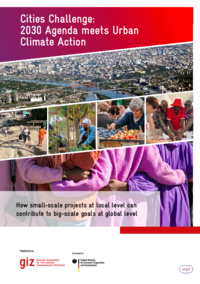- DE |
- EN
Cities Challenge: 2030 Agenda meets Urban Climate Action
2021 - How small-scale projects at local level can contribute to big-scale goals at global level
Author:
Laura von Puttkamer Barbara Scholz, Andrea Renger, Lennard Kehl, Katrin Eisenbeiß (
Publisher:
Deutsche Gesellschaft für Internationale Zusammenarbeit (GIZ) GmbH
Description:

What does a climate-friendly, inclusive, safe, resilient and sustainable city look like in practice? In 2019, GIZ’s CitiesChallenge 2030 ideas competition set out to showcase and support examples for this all over the world. More than 30 projects replied to the calls for application. GIZ and BMZ selected four winning projects to be Urban Living Labs:
- In Portoviejo, Ecuador, women in a poor peri-urban settlement acted as guardians to support the vulnerable and the sick, working together with the municipal disaster management department. With the help of students and experts from universities and professional organisations, they managed to secure paths and public spaces from landslides.
- In Jordan’s capital Amman, an NGO created microforests in high-density, precarious neighbourhoods. This triggered cross-sectoral cooperation between stakeholders, who together tested novel planting methods to improve air quality, combat heat islands and create rainwater storage.
- In Windhoek, Namibia, slum dwellers on the outskirts of the city created a neighbourhood park that invites people to stay and play while protecting their homes from seasonal flooding. They also planned the future development of their own settlement through a participatory process, supported by the municipality.
- In the Serbian capital Belgrade, food service operators and digital start-ups in the Serbian capital Belgrade saved food from being destroyed. Instead, they made it available to families in need while improving urban food security and reducing the burden on landfills.
These four Urban Living Labs show some of the many ways that interventions in cities bring local governments, experts, communities and entrepreneurs together. By working together with local partners, they improved the resilience and quality of life for vulnerable groups, ensured access to public services, used resources more sustainably, and promoted climate change mitigation and adaptation.
Categories:
Region:
Language:
English
Page count:
102
Copyright:
Deutsche Gesellschaft für Internationale Zusammenarbeit (GIZ) GmbH
Latest publications
Together for a cleaner city: improvements in waste management
2025 - The partnership between Dabola (Guinea) and Dortmund (Germany)
Action planning for sustainability reporting
2025 - Documentation of the Connective Cities dialogue event from 2 to 4 December 2024 in Berlin




